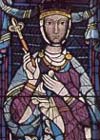Ermesinde, Countess of Luxembourg
| Ermesinde | |
|---|---|
 | |
| Countess of Luxembourg | |
| Reign | 1197 – 12 February 1247 |
| Predecessor | Otto I |
| Successor | Henry V |
| Born | July 1186 |
| Died | 12 February 1247 (aged 60–61) |
| Burial | |
| Spouse | Theobald I, Count of Bar (m. 1197 - 1214; his death) Waleran III, Duke of Limburg (m. 1214 - 1226; his death) |
| Issue more... | |
| House | House of Namur |
| Father | Henry IV, Count of Luxembourg |
| Mother | Agnes of Guelders |
Ermesinde (July 1186 – 12 February 1247) ruled as the countess of Luxembourg from 1197 until her death. She was the only child of Count Henry IV and his second wife Agnes of Guelders.
Succession
[edit]Prior to her birth, Ermesinde's aging father, Count Henry IV of Luxembourg, had recognized his nephew Count Baldwin V of Hainaut as his heir presumptive. However, the 74-year-old count reunited with his estranged wife, Agnes of Guelders, and fathered a daughter, Ermesinde, who displaced Baldwin as heir presumptive.[1] Upon Henry's death in 1196, a war of succession took place. At its end, it was decided that Henry's fiefs would be split: Baldwin would have Namur, Ermesinde would have Durbuy and La Roche, and Luxembourg would revert to their common liege, Emperor Henry VI, who then gave it to his brother Otto.
Rule
[edit]Ermesinde was initially betrothed to Count Henry II of Champagne, but the engagement was cancelled in 1189. Instead her first husband was Count Theobald I of Bar.[2] He successfully negotiated with Count Philip I of Namur and his brother Count Baldwin IX of Flanders for renunciation of Luxembourg, thus making Theobald and Ermesinde the count and countess of Luxembourg.[3]
When Theobald died in 1214, Ermesinde married Count Waleran III of Limburg (1180–1226), with whom she then ruled Luxembourg.[2] In 1223 Ermesinde and Waleran pressed their claim to Namur against Philip II, but were ultimately unsuccessful. After Waleran's death, Ermesinde ruled Luxembourg alone for two decades. She proved to be an effective administrator, granting charters of freedom to several towns and increasing the prosperity of her country.[1]
Grave
[edit]
According to legend, Ermesinde saw the Virgin Mary, and planned the construction on that spot of the Clairefontaine Abbey.[2] In her will she asked that she be buried at this location. The abbey was built by her son, Henry V.[4] After many years, the abbey was destroyed in the late 18th century by French troops. In 1747, shortly before the old abbey was destroyed by French troops, the nuns had hidden Ermesinde's remains in a chapel, where they were found by the Jesuits during 1875-1877 reconstructions. The remains are now in the crypt of the chapel of Clairefontaine.
Children
[edit]The children of Ermesinde and her first husband, Theobald I of Bar, were:
- Renaud (died before 1214), Seigneur of Briey
- Elisabeth (died 1262), married Valéran of Limburg, Lord of Monschau
- Margaret (d?), first married Hugh III, Count of Vaudémont (died 1243); later married Henry of Bois, regent of Vaudémont.
The children of Ermesinde and Waleran III, Count of Limburg were:
- Henry V of Luxembourg (1216–1281), Count of Luxembourg[2]
- Gérard I of Durbuy, Count of Durbuy (died 1276)
- Catherine of Limburg (died 1255), wife of Matthias II, Duke of Lorraine
References
[edit]- ^ a b Tutton, Thomas. "Rivalries, Battles and the Great Ermesinde", RTL Today, February 28, 2020
- ^ a b c d P. Péporté, Historiography, Collective Memory and Nation-Building in Luxembourg, (Brill, 2011), 109-110. – via Brill (subscription required)
- ^ John A. Gade, Luxemburg in the Middle Ages, (Brill, 1951), 74-75.
- ^ P. Péporté, Historiography, Collective Memory and Nation-Building in Luxembourg, 115.
External links
[edit] Media related to Ermesinde of Luxembourg at Wikimedia Commons
Media related to Ermesinde of Luxembourg at Wikimedia Commons



